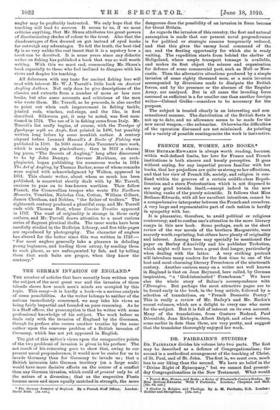FRENCH MEN, WOMEN, AND BOOKS.*
MISS BETHA.M-EDWARDS is always worth reading, because, within well-defined limits, her love for France and French institutions is both sincere and keenly perceptive. It goes without saying, for any impartial person familiar with her books, that her prejudices are quite as strong as her affections, and that her view of French life, society, and religion is con- fined within the grooves of a certain middle-class Repub- licanism and a stern Protestantism which is not disposed to see any good outside itself,—except indeed in the now thinning ranks of the purely scientific. It follows that Miss Betham-Edwards, with all her excellent intentions, cannot be a comprehensive interpreter between the French and ourselves. A very large and representative part of each nation is hardly in sympathy with her.
It is pleasanter, therefore, to avoid political or religious controversy, and to confine one's attention to the more literary essays in this new book. Some perhaps, such as the short review of the war novels of the brothers Margueritte, were scarcely worth reprinting, but others have plenty of originality and interest. Among these may specially be mentioned the paper on Barbey d'Aurevilly and his publisher Trebutien, which might well have been a great deal longer, particularly when dealing with the latter. A very striking portrait will introduce many readers for the first time to one of the best and most charming literary Frenchmen of the nineteenth century. Another curious essay on a writer not well known in England is that on Jean Reynaud, here called, by German inspiration, "a God-intoxicated Frenchman." We have also the whole story of Balzac's correspondence with l'EtranOre. But perhaps the most attractive 'pages are to be found early in the book, in the long article, followed by a selection of translations, on "French Domestic Poetry." This is really a review of Mr. Bailey's and Mr. Eccles's recent volumes, which are a delight to every one who cares for the subject. But it is full of interest on its own account. Many of the translations, from Gustave Nadaud, Paul Deroulede, Jean Richepin, Albert Delpit, and other writers, some earlier in date than these, are very pretty, and suggest that the translator thoroughly enjoyed her work.










































 Previous page
Previous page